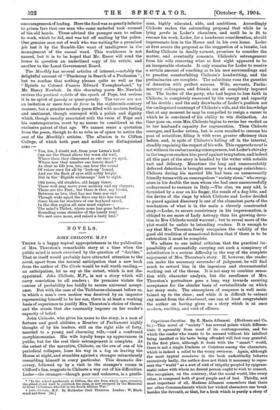JOHN CRILCOTE. 311.P.1'
'THERE is a happy topical appropriateness in the publication of Mrs. Thurston's remarkable story at a time when the public mind is much exercised by the question of " doubles." That in itself would probably have attracted attention to the novel, apart from the natural anticipation that a new book from the author of The Circle would be well worth reading,— -an anticipation, let us say at the outset, which is not dis- appointed. John Chilcote, 31.P., is not a story which will -carry conviction to all readers; its premises violate the -canons of probability too boldly to secure universal accept- a,nce. But with the case of the Tichborne claimant before us, in which a man's own mother was deceived by an impostor representing himself to be her son, there is at least a working basis of experience to justify Mrs. Thurston's choice of theme, and the strain that she constantly imposes on her reader's 'capacity of belief.
John Chilcote, who gives his name to the story, is a man of fortune and good abilities, a Member of Parliament highly thought of by his leaders, still on the right side of forty, married to a young and charming wife,—and a confirmed znorphinomaniac. His wife loyally keeps up appearances in public, but for the rest their estrangement is complete. At the outset of the narrative, Chilcote, on the eve of one of his periodical collapses, loses his way in a fog on leaving the House at night, and stumbles against a stranger miraculously resembling himself in every particular. This dramatic din- -cover'', followed up by a visit to the stranger's rooms in Clifford's Inn, suggests to Chilcote a way out of his difficulties. Loder—the stranger—though poor and unknown, is.a gentle-
"In the school quadrangle at Clifton, the site from which, upon occasion, the grand stand used to overlook the close, is now occupied by the Memorial to those Cliftonians who fell in the South African War."
.1. John Chilcote, M.P. By Katherine Cecil Thurston. London : W. Black- wood and Sons. [Os.]
man, highly educated, able, and ambitious. Accordingly Chilcote makes the astounding proposal that while, he is lying perdu in Loder's chambers, and until he is fit to resume his work, Loder, for a handsome consideration, should impersonate him in the House and in his own home. Loder 'at first scouts the proposal as the suggestion of a lunatic, but finding Chilcote in deadly earnest, promises to consider the matter, and eventually consents, Chilcote's estrangement from his wife removing what at first sight appeared to be an insuperable obstacle. It only remains for Loder to receive a certain amount of coaching as to his new surroundings and to practise counterfeiting Chilcote's handwriting, and the preliminaries are complete. The substitute runs the gauntlet of detection with perfect success. Wife, servants, Parlia- mentary colleagues, and friends are all completely imposed on. The leader of the party, who had begun to lose faith in Chilcote, is completely reassured by the energy and capacity of his double ; and the only drawbacks of Loder's position are the undisguised contempt of Chilcote's wife, and the knowledge that at any moment he may be compelled to resign a career in which he is convinced of his ability to win distinction. As time goes on, even Mrs. Chilcote begins to revise her verdict as to her husband's capacity for regeneration. Then Chilcote emerges, and Loder retires, but is soon recalled to resume his post of substitute, filling it with even greater efficiency than before, and, in spite of Chilcote's falling' off in the interval, steadily regaining the respect of his wife. This rapprochement is not without its embarrassing consequences, but Loder's chivalry in the long run renders him proof against temptation, and indeed all this part of the story is handled by the writer with notable tact and delicacy. Meantime the long and unaccountably deferred detection is brought nearer by a strange coincidence. Chilcote during his married life had been on unnecessarily friendly terms with an unscrupulous "society siren," who recog- nises in his double the man whom she had once unsuccessfully endeavoured to ensnare in Italy.—The clue, we may add, is furnished by a scar on his finger, the result of a dog-bite, and the device of the rings by which Chilcote and Loder decided to guard against discovery is one of the clumsiest parts of the mechanism of what is in the main a cleverly constructed story.—Loder, to secure consistency in his impersonation, is obliged to see more of Lady Astrnpp than his growing devo- tion to Eve Chilcote would warrant; but to reveal more of the plot would be unfair to intending readers. It is enough to say that Mrs. Thurston freely recognises the validity of the good old tradition of sensational fiction that if there is to be extrication it must be complete.
We adhere to our initial criticism that the practical im- possibility of successfully carrying out such a conspiracy of substitution is a serious difficulty in the way of the complete enjoyment of Mrs. Thurston's story. If, however, the reader can make the necessary surrender of judgment, he will find much to reward him in the ingenious and circumstantial working out of the theme. It is not easy to combine sensa- tion with character analysis, but the excellence of Mrs. Thurston's portraiture goes a long way towards securing acceptance for the slender basis of verisimilitude on which her story rests. The atmosphere of suspense is well main- tained up to the close ; and while it is difficult to extract any moral from the dam' ment, one can at least congratulate the author on having given us a story which is at once modern, exciting, and void of offence.










































 Previous page
Previous page